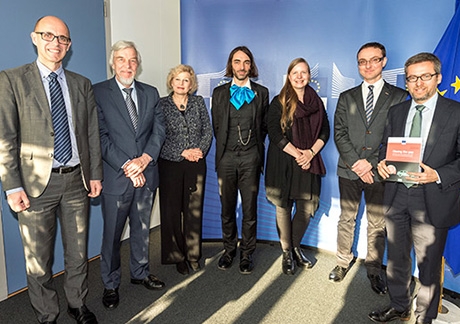
EC advisors call for update of GM legislation
The EU Commission's Chief Scientific Advisors urge the Commission to revise the EU's GMO Directive in order to harness gene editing.
The seven advisiors of the EU Commission (SAM) call on the European Commission (EC) to revise the existing GMO directive 2001/18/EC because the recent ruling of the European Court of Justice has revealed that it is not abreast with science. There is a need to improve EU GMO legislation to be clear, evidence-based, implementable, proportionate and flexible enough to cope with future advances in science and technology in this area, the advisors said.
Particularly, they recommend to verify if the Directive’s paradigm of "naturalness" can be uphold as new targeted mutation technologies such as gene editing create crops with genetic alterations indistinguishable to crops created by naturally occuring mutations or by random mutagenesis. However, the European Court of Justice (ECJ) recommended not to exempt gene edited crops from the EU’s GMO legislation but crops that have been created by chemically and radiation-induced mutagenesis due to their long safety record.
The advisors argue that it has been shown that "unintended effects will occur less frequently in gene edited products" and that "these products are potentially safer than the products of random mutagenesis." In order to assess whether a new crop feature such as herbicide tolerance constitutes a risk for human health and the environment, they recommend to "examine the features of the final products regardless of the underlying technique used to generate that product."
The advisors stressed that it is a misconception to believe that subjecting gene edited crops to the regulatory regime of the EU’s GMO Directive will create more transparency or freedom of choice to EU consumers as suggested by some NGOs. "It cannot be excluded that products obtained by directed mutagenesis will enter the European market undetected. It will be impossible to identify whether the mutations have occured spontaneously or were introduced by human intervention or to attribute them to a specific technique such as random or directed mutagenesis." Competent EU authorities will be faced with that problem, when exporting countries start to market gene edited varieties that they have already decided not to regulate. According to the advisors, the JRC and the European Network of GMO Laboratories currently prepare a document looking at arising issues with the detection and quantification of gene edited DNA.
The advisors, however, do not recommend to change the GMO Directive without asking the public. They promote to initiate a broad social dialogue "on how we want our food to be produced in Europe" in order to establish "the highest possible protection of health and the environment" and at the same time to create a favourable regulatory environment for innovation so that society can benefit from new science and technology.




 SANOFI
SANOFI